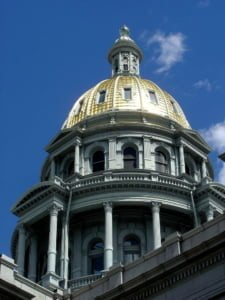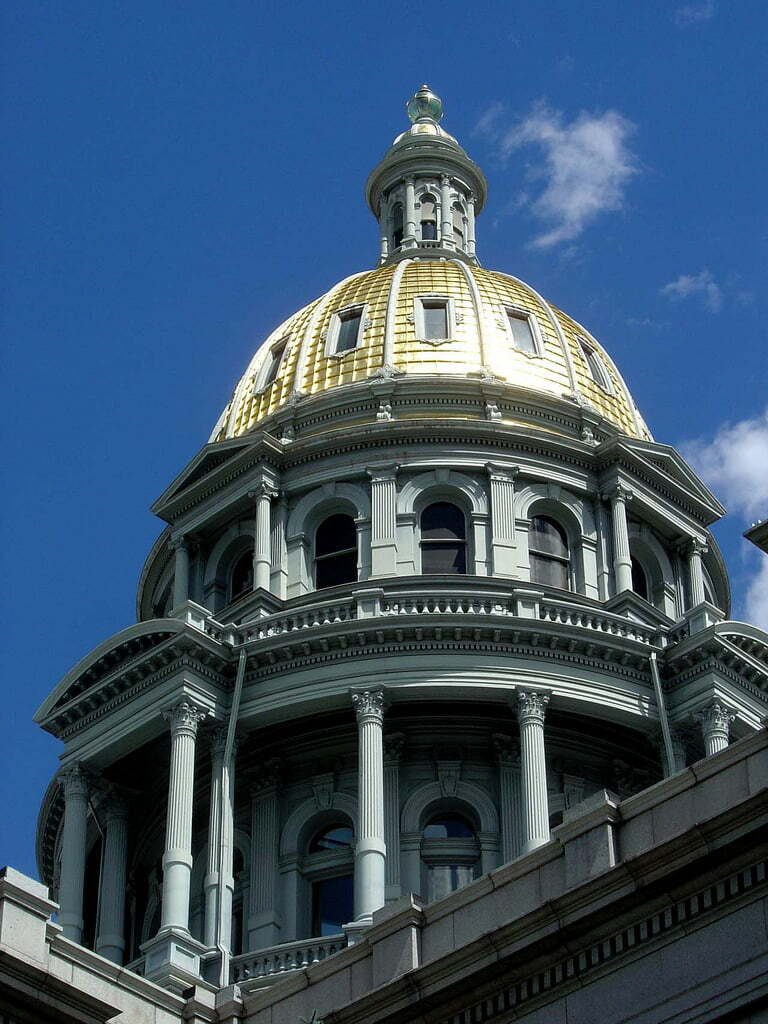 The second regular session of Colorado’s 73rd General Assembly adjourned sine die, May 11. The legislature ran out the 120-day clock, hearing 657 bills, and passing well over 500 of them.
The second regular session of Colorado’s 73rd General Assembly adjourned sine die, May 11. The legislature ran out the 120-day clock, hearing 657 bills, and passing well over 500 of them.
The 2022 legislative session saw a flurry of bills that directly impacted the dental profession. From millions of dollars for rural providers and other bills aimed at expanding the workforce in Colorado, to the creation of the new dental hygienist peer assistance program, it was a busy session for the CDA.
The CDA worked on more than 50 bills for the profession this year.
Here are some of the highlights of bills that passed:
HB22-1005: Healthcare Preceptors Tax Credit (CDA Priority, Support)
- Expands the rural and frontier healthcare preceptor tax credit from 200 to 300 preceptors a year and expands who can qualify for the tax credit, including adding dental hygienists to program qualifications.
HB22-1115: Prescription Drug Monitoring Program
- Requires every prescriber to query the prescription drug monitoring program (PDMP) during the first fall before prescribing an opioid or benzodiazepine. Also, would allow prescribers to give access to unlimited designees, and would also create a process for practitioners and pharmacists to get reimbursed for costs associated with integrating the PDMP platform with medical records systems. A companion bill, SB22-027, also passed to implement recommendations to improve the PDMP program based on a March 2021 report issued by the office of the state auditor.
HB22-1240: Mandatory Reporters
- Creates a task force to study and report back to the General Assembly its recommendations. The task force recommendations are anticipated to make numerous changes to requirements for mandatory reporters, which include dentists and dental hygienists. The originally introduced bill changed the time frame for reporting, expanded reportable conditions and imposed employer notification requirements.
HB22-1267: Culturally Relevant Training Health Professionals
- Creates a culturally relevant and affirming healthcare training grant program to provide money to nonprofit entities (including provider associations like the CDA) to develop new culturally responsive training programs.
HB22-1269: Healthcare Sharing Plan Reporting Requirements (CDA Priority, Amend)
- The bill requires the Division of Insurance to oversee individuals offering healthcare sharing plans or arrangements that serve Colorado residents and places numerous requirements on these plans regarding the information they must share with the state. The CDA team amended the bill to ensure that direct patient-provider plans and charitable payment options for dental patients were held harmless under the bill.
HB22-1291: Sunrise Review
- Made changes to the sunrise review process, including shortening the timeframe for sunrise reports and exempting professions with lower numbers of providers from DORA review. CDA secured clarification in legislative record to the intent of exemptions to ensure process adherence and avoidance of loopholes.
HB22-1292: Flexibility in Oral Health Program Funding (CDA Priority, Amend)
- Allows for money allocated for dental loan repayment to be used for other oral health programs like fluoridation, Cavity Free at 3 and other preventive interventions. CDA secured an amendment to ensure language was added to the legislative declaration stating the importance of the dental loan repayment program and adding language requiring a report to the Joint Budget Committee on how the money is spent.
HB22-1350: Regional Talent Development Initiative Grant Program
- Creates a $91M grant program to meet regional labor market needs and ensure workforce development as the state continues to see a worker shortage after the COVID-19 pandemic. Money may be available under this program to expand dental hygiene education programs.
HB22-1352: Stockpile for Declared Disaster Emergencies
- Requires the state to procure and keep a stockpile of essential supplies to better respond to a future disaster emergencies and prevent shortages.
HB22-1356: Community Based Nonprofit Grants
- Makes $35M available to community-based nonprofits. There is potential for some local dental care programs to be eligible.
HB22-1358: Clean Water in Schools and Child Care Centers
- The bill was proposed to require every school and childcare center to install filters on all drinking water sources to mitigate lead in water. Ultimately it was amended to require testing and mitigation. There was a fear that these filters might have stripped fluoride from drinking water, which is of less concern given the final form of the passed bill.
SB22-058: Dental Hygiene Peer Assistance (CDA Priority, Support)
- Creates the Dental Hygienist Peer Health Assistance Program to assist dental hygienists with any physical, emotional, and psychological problems. The program mirrors the existing program for Colorado dentists.
SB22-068: Provider Tool to View All-payer Claims Database
- Requires CIVHC to implement a searchable tool to facilitate the review of certain health claims reimbursement data. This bill may help make insurer payment rates more transparent to providers and patients.
SB22-115: Clarifying Terms Related to Landowner Liability
- Clean-up from a court case that potentially held businesses liable for damages or injuries based on the potential that the products or services they offer are controversial or a prior history of any incident at a similar business type.
SB22-116: Increase Occupational Credential Portability (CDA Priority, Amend)
- Updates the Colorado Occupational Credential Portability Act. MBS secured an amendment to ensure education levels had to be equivalent to ensure proper licensing among states, which could be important in avoiding future transfer of non-equivalent dental hygiene and dental therapist credentials to Colorado.
SB22-172: Colorado Rural Health-care Workforce Initiative (CDA Priority, Support)
- Creates a $5.75M grant program to expand the number of healthcare professionals in rural Colorado, including a $400M allocation to the dental school for rural track programs. The CDA secured an amendment to ensure those getting financial incentives through this rural workforce initiative could still participate in the state’s Dental Loan Repayment Program.
SB22-192: Credential Attainment
- Allows the Department of Higher Education to create stackable credential pathways and incremental achievements as a pathway to degree completion. Could be applicable to dental workforce training programs, including dental assisting and dental therapy programs.
SB22-219: Regulate Dental Therapists (CDA Priority, Monitor)
- Creates a new mid-level dental profession. Dental therapists must practice under the direct supervision of a dentist for 1,000 hours and then under indirect supervision after 1,000 hours.
SB22-226 Programs to Support Healthcare Workforce
- Leverages both federal dollars and state resources to support the education, training, recruitment and retention of healthcare workers through June 2025. This includes providing technical assistance to community partners to address resiliency, funds reentry of unlicensed support personnel including dental assistants, in addition to several bills expanding access to care in rural areas of Colorado.
SB22-236: Review of Medicaid Provider Rates
- Changes the Medicaid provider rate review schedule from every five years to every three years. Reduces the advisory committee membership from 24 members down to seven members.
Here are some highlights from bills that did not pass:
HB22-1064: Prohibit Flavored Tobacco Regulate Synthetic Nicotine
- Would have prohibited the sale of any flavored or synthetic tobacco product in the state, aiming to reduce youth use (with potential positive oral health impacts).
HB22-1152 Employer Restrictions Marijuana
- Would have made it illegal for an employer to discipline or fire an employee for using recreational marijuana at work or home and medical marijuana while at work.
HB22-1163: State Income Tax Deduction for Medical Expenses
- Would have created a state income tax deduction for qualifying medical expenses for the next seven years. The CDA team successfully amended the bill before introduction to ensure the applicability of the bill to dental expenses had it moved forward.
HB22-1384: Naturopathic Doctor Formulary
- Would have removed the limitation to only biological substances on the naturopathic prescription drug formulary and clarified that the formulary may contain certain prescription substances or devices. There was discussion of allowing naturopathic doctors to prescribe fluorides under this bill.
SB22-078: Prior Authorization Exemption Health-care Provider
- Died on calendar. Qualified providers would have been given an alternative to prior authorization such as not having to seek prior authorization, incentives to reduce wait time, or any other innovative program that rewards the provider or reduces wait times.
SB22-087: Healthy Meals for All Public School Students
- If Colorado applies and is chosen to participate in the federal demonstration project for direct certification of children receiving Medicaid benefits the state will provide free meals to all students enrolled in public and charter schools across the state. Better nutrition is associated with improved oral health. (A nearly identical bill with the same end goal was passed as HB22-1414, which asks voters to decide a November ballot initiative to determine whether to fund this program by limiting itemized deductions for high earners).
SB22-189: Colorado Geriatric Provider Pipeline Program
- Died on calendar. Would have created the Colorado multidisciplinary geriatric provider pipeline program at the University of Colorado Anschutz medical campus. The program would have expanded training opportunities for clinical graduate students.
In addition to the long list of bills that the CDA engaged in during the 2022 legislative session, dentistry and healthcare saw impacts from a number legislative actions on financing and budget.
Budget/ARPA
In 2022, the General Assembly passed a $35.4 billion budget. Additionally, the legislature allocated $3.5 billion in federal COVID-relief funding, with a significant portion going to address workforce issues, affordable housing, mental health, and $600 million going to the Unemployment Insurance Trust Fund to stave off significant premium increases expected next year.
Funding for healthcare providers increased across the board, with a $78 million allocation directed at healthcare workforce development and retention. The state also increased Medicaid provider rates by 1%.
Additionally, payment reform in both Medicaid and private insurance was addressed through approval of legislation bringing state and federal alignment for out-of-network charges and a significant shift in Medicaid prior authorization for behavioral health providers, a trend that may set precedent for other provider types moving forward.
State legislators now shift to focus to the upcoming Nov. 8, 2022 election. A statewide redistricting effort to balance population in U.S. Congressional, State House and State Senate seats will drive greater legislator turnover than usual. The CDA, CODPAC and CDA small donor committee will be actively engaging with legislators to educate and inform on key dental issues and cultivate allies for legislative cycles to come.


